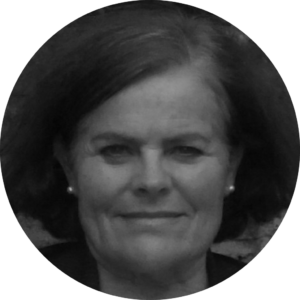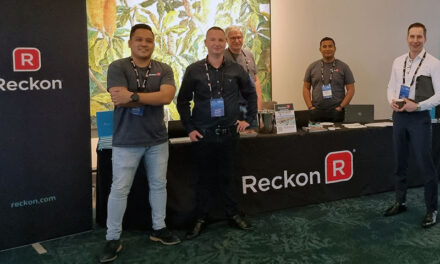Michaela Draper is a solution-focused business analyst based in New Zealand. With decades of project management, process mapping, data analysis, and consulting experience spanning banking, government and the private sector, Michaela is now focused on helping small businesses set up affordable and simple-to-use accounting systems.
We recently sat down with Michaela to hear her career story and were bowled over by her incredible depth of computing knowledge.
Michaela, could you talk us through your career journey to become a senior business analyst?
I was fascinated by computers from a very early age and after poring over blueprints of someone I met socially who designed the first moving neon sign in Christchurch, followed by meeting a Cobol programmer and quizzing him endlessly, my interest increased.
After I graduated, I moved to Wellington and went to night school to discover if I had the right type of mind for this work. Next thing I knew a friend in the industry provided me with an introduction to the IT Manager at the National Bank.
After completing an aptitude test, the usual tool for assessing an applicant back then, they hired me as a programmer. This was a great start for a career as a business analyst because, through coding, I learned about data which has given me the edge over many other analysts.
My advice for anyone thinking of getting into analysis or IT management, is to start as a developer – it will be invaluable down the track.
After two years at the National Bank, I moved on to a job with Shell Oil NZ as their first ‘PC analyst’. This was back in the mid 80’s. My first day at Shell was the day their second PC arrived, but very soon there was a PC on every desk, and I was the PC tech, the trainer, the application writer – you name it.
Back then, computer output was extremely limited; think green screens with no graphics, and main frames producing continuous perforated A3 paper covered in very large financial numbers with no commas.
Graphical user interfacing was not something many people knew about, let alone had experienced.
My first Access database effort was very exciting as the Accounts Receivable Manager, and I stood over the printer and watched those dreadful numbers turn into ‘a picture tells a thousand words’ for the very first time.
I moved on from Shell to many BA roles covering a wide variety of business computing from technical assignments to dealing with the business and eliciting their requirements. While living in Sydney for 5 years at the beginning of the Millennium, I worked as a PM/analyst for the Roads and Traffic Authority (RTA) designing and writing some of their first online applications, including custom building one of the world’s first successful electronic work flow applications.
That’s a fascinating pathway. Could you tell us more about your work today?
Since 1995, I have been an independent consultant/analyst working mainly in larger government departments and banks, but I’m now keen to shift gears and work in an ad hoc way for small businesses. I started up a small manufacturing business in the 90’s and I believe with my combined experience, I have plenty to offer in this space.
What drew you to want to work with small businesses, and how will you be helping them with accounting and software?
I relate well to people who struggle with computers, and I know how to put them at ease.
At one point I trained the NZ High Court judges. This was at a time when they had never as much as had a mouse in their hand. They were uncomfortable to say the least.
I received accolades for making the course understandable and putting them all at ease.
Then in London at the Millennium I introduced an older friend, a CEO, to a laptop and that was a real challenge as he was frightened stiff of coming across as a bunny. However, it wasn’t long before he was belting out emails like everyone else.
Small business owners are often no frills, practical people who want to get the job done in the least amount of time. So, when helping small business people with their accounting, I’ll be at the ready to both help them select the right package with the right components and to train them to become familiar with the package they choose, be it the second to none starter, Reckon One, or one of Reckon’s more comprehensive packages.
Does being a generalist make marketing yourself to different audiences challenging?
Marketing myself for more formal IT roles is easy because we work through agents. They advertise and we apply.
When thinking about my approach to marketing to small businesses, I shall begin with the message that I am approachable and there to help, whether they are new to small business or have been working with accounting packages for quite some time.
Where will you start when offering small businesses accounting and software advice?
I would begin by assessing where they are at in terms of their knowledge and experience with accounting packages and their experience in running a small business.
If new to this game, I would start them with bank reconciliations and then when they are comfortable, move on to the next step, creating invoices etc. – always moving at a pace which suits them.
Because of my background I would be offering help in any aspect of small business management. Where appropriate I would also offer them tailored spreadsheets to save them time over and above assisting clients to maximise the excellent suite of products Reckon has to offer.
Can you tell us about your experience with Reckon?
I was introduced to Reckon’s Quickbooks 20 years ago because that was the only package my accountant was prepared to work with. I thank him for that.
I am relatively new to Reckon One and I have to say, most impressed by its intuitive design. It is a fantastic package and has very attractive starter price options.
I am in a very good position to help any client select the appropriate package for them and then assist them to make the solution work for them in an effortless way by providing a simplified chart of accounts template along with an already formatted set of vital reports, etc.

Michaela Draper









